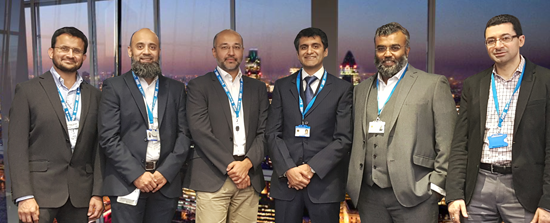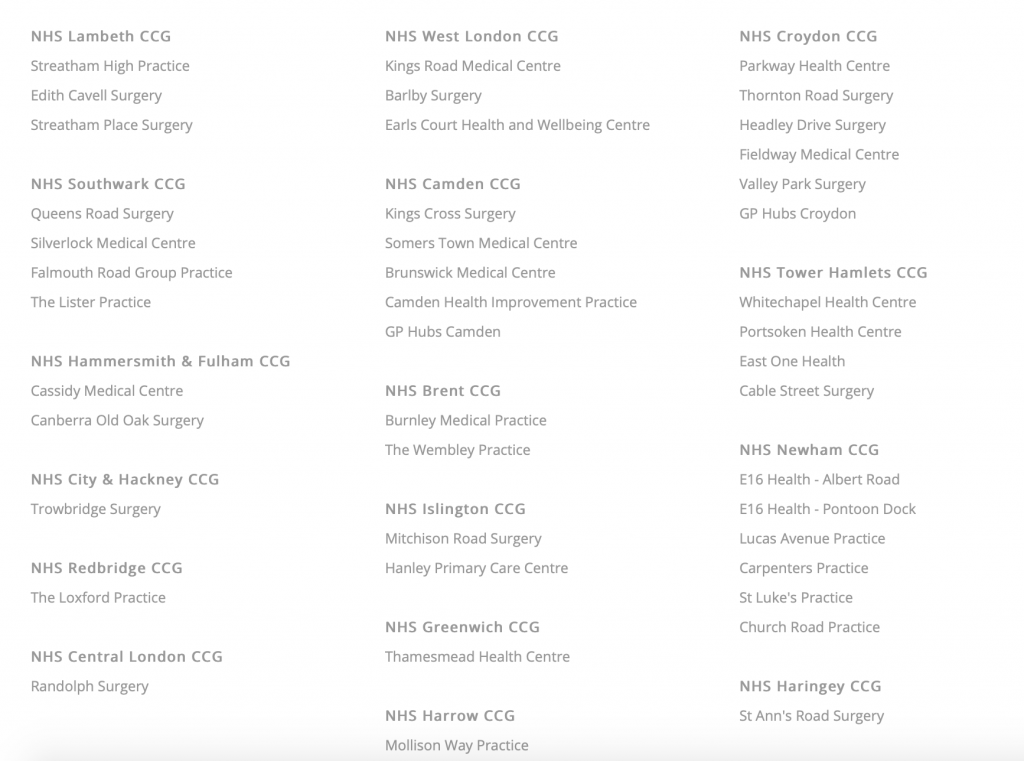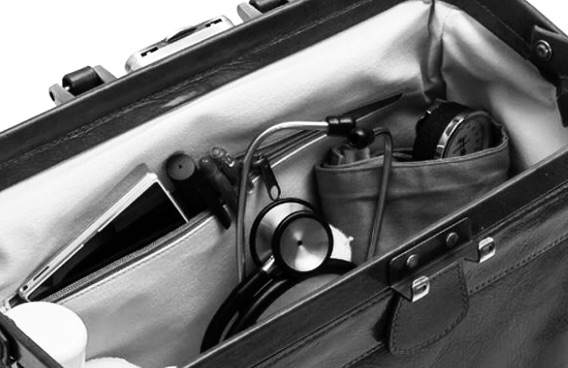NHS GPs: ‘The doctor will see your bank account now’
By Paul Coleman
Summary: ‘Doctorpreneurs’ have transferred NHS contracts to run 49 London GP surgeries to an American corporation.
**
A thirteen-year-old lad simply wants to ride his bike from dawn until dusk.
Wheezy asthma often halts his pedalling. Doctor Stewart – on his rounds – arrives at the breathless boy’s north London home.
It’s 1975. The National Health Service (NHS) is not even thirty-years-old. Yet millions of Londoners already rely on their General Practitioner (GP) surgeries to provide free NHS care whenever they need it.
The NHS contracts doctors to be GPs but the doctors care more for patients than cash. GPs know their patients’ and their circumstances. People put a lot of trust in their GPs.
Doctor Stewart retrieves a stethoscope from a battered leather doctor’s bag; two objects that symbolise this public trust in GPs.
The doctor listens to the boy’s latest wheezes. “I’m sure you’ll outgrow this asthma,” says Doctor Stewart.
Sure enough, the boy is soon riding his bike, breathing freely.
Slogans
Zip forward to the late 1990s. Prime Minister Tony Blair and Chancellor Gordon Brown proclaim that “things can only get better” under their New Labour project.
Margaret Thatcher once issued brazen public decrees to hail the sale of publicly owned utilities in the 1980s, such as gas, electricity and telecommunications.
Blair and Brown know they would risk provoking voters’ anger by openly privatising the NHS and GP primary health care; so, they use stealth to open up public health – and also education – to private capital interests.
New Labour veneers this gradual NHS privatisation as ‘modernisation’, ‘partnership working’ and ‘patient/consumer choice’.

Doctorpreneurs
Such Blairite Thatcherism spawns ‘doctorpreneurs’ – younger doctors keen to transplant the business of private profit into the body of primary public health care.
Trainee doctors – Usman Quraishi, Muneeb Choudhry, Tarek Radwan, Hasnain Ali Abbasi, Fiyaz Lebbe, and Mohammad Aumran Tahir – graduate from St George’s University of London. The six newly qualified doctors keenly scope New Labour’s policies.
The four GPs and two specialist doctors set up AT Medics in 2004 (above photo). The fledgling business takes over a small south London NHS GP practice in Mottingham.
APMS
The six doctorpreneurs then bid for lucrative new primary health care contracts called Alternative Provider Medical Services (APMS). Set up by the New Labour government, these contracts allow GPs and their companies to run publicly funded GP surgeries and to employ doctors.
Patients do not pay fees but ‘GP consortia’ companies can profit from public NHS funds to run GP surgeries.
AT Medics claims to be the first to win an APMS contract. The six doctorpreneurs get a green light to run the NHS GP surgery in North Kensington. The company also gets to run surgeries in Bromley, Camden, and Croydon.
After 2011, AT Medics receives most of its revenue from APMS contracts awarded by NHS England.
In early 2020, AT Medics successfully bids for six ‘lots’ to run GP surgeries, offered under ‘PRJ736 London APMS GP Contracts‘. These six contracts alone are worth some £121 million.
Contracts
By early 2021, AT Medics holds contracts to run 49 GP surgeries that serve 370,000 Londoners across 19 London boroughs (see list below).
The directors receive £5.1m in dividends in the year ending in March 2019.
Turnover is £47.8m for the year ending in March 2020. AT Medics makes an after-tax profit of £7.1m.
Takeover
Out of a corporate sky, in February 2021, Operose Health Limited swoops to take over AT Medics – including those contracts to run 49 GP surgeries in London.
The AT Medics doctorpreneurs join the Operose Health board but they are no longer in control.
Operose Health chief executive Samantha Jones started as an NHS paediatric and general nurse. Before joining Operose, Samantha Jones headed NHS England’s new care models programme.
The Corporation
Operose Health is a wholly-owned British subsidiary of the Centene Corporation, a Fortune 500 company, listed on the New York Stock Exchange and ranked as the 42nd most successful corporation in the United States.
The Centene Corporation, one of America’s largest private health insurance companies, depends on government-funded Medicaid and Medicare public health programmes that serve under-insured and uninsured poorer and elderly Americans.
Headquartered in St Louis in the State of Missouri, Centene employs over 71,000 people. They help the corporation to earn over $111m (£80m) in revenue in 2020.
Centene, in listing its ‘product and presence’, states ‘Operose Health leverages the management of General Practitioner physicians…based on the blueprint outlined by the NHS’.
Centene has studied that blueprint. It knows that NHS England, the body set up in 2011 to commission services for the NHS, has an annual budget nearing £130 billion in 2021.
Scrutiny
Operose Health’s takeover of AT Medics means Centene now effectively owns those 49 GP surgeries in London.
AT Medics reportedly sought prior authorisation for the Operose deal from NHS England and from 13 Clinical Commissioning Groups. CCGs are the public bodies – led by GPs – that commission GP services for local people.
Each CCG has a Patient Participation Group (PPG) that aims to ‘put the patient at the heart of everything it (the CCG) does’.
PPGs might sound as boring as unbuttered toast. However, ignorance and apathy about their function enables CCGs to publish little or no information about the corporate takeover of these GP contracts. The few eagle-eyed patients active in PPGs do not get a proper chance to scrutinise the impact of the deal on GP surgeries.
Hence, Londoners registered at those surgeries are not informed about who now runs their surgeries. The vast majority do not even know they don’t know.
Sensed
In a further twist, on 1 April, Samantha Jones reportedly quits Operose. Jones is going to work as ‘an expert adviser for NHS transformation and social care delivery’ for Prime Minister Boris Johnson at 10 Downing Street.
That leaves Operose’s Nick Harding and Edward McKensie-Boyle in charge. Harding is a former senior NHS England medical adviser, and a GP himself. McKensie-Boyle is a former ‘healthcare team director’ for Deloitte.
As for the six AT Medics doctorpreneurs, they continue to boast how they “sensed the changing times of primary care within the NHS before most of their peers”.
Margin
It is too early to precisely say how Operose/Centene’s profit-driven efficiencies will impact on the quality of healthcare provided by GPs. Will it result in more GPs being recruited and retained? Or will a corporate profit motive cut costs and GP numbers?
The centralisation of many GPs into polyclinics since those New Labour days has already led to patients getting fewer appointments with their preferred family doctors. Patients find themselves repeating their medical histories to excessively used locum doctors. GPs committed to local community life have diminished in influence and number.
Operose has stated it will continue to protect patients’ personal medical records and would not share that data with a third party. ‘Our care is free at the point of delivery, regulated and inspected by the Care Quality Commission,’ states Operose.
Centene brands itself publicly with a soft mantra – ‘transforming the health of the community, one person at a time’.
However, Centene lures its main targets – potential investors – with a hard cut-throat lexicon. It defines itself as a ‘robust growth company’ that seeks ‘operational efficiencies’ to achieve ‘a compelling runway for margin expansion’.
Private healthcare
Centene also operates within a highly competitive and ultra-corporate American healthcare market. However, the corporation has also bought stakes in private healthcare in Britain.
Centene is a major shareholder in Circle Health. In January 2020 Circle Health acquired BMI Healthcare, a leading private hospital group in Britain.
The Competition & Markets Authority promotes competition to benefit consumers’ in Britain. The CMA noted in 2020 that ‘the increase in Centene Corporation’s shareholding in Circle…may have resulted in Centene being able to exercise material influence over the merged entity’.
Trust
Centene suffers a challenge to its reputation in March 2021, Ohio State attorney general Dave Yost announces the State of Ohio will sue Centene and its subsidiaries over an alleged ‘breach of Medicaid contract’.
Yost alleges this breach enabled the corporation to ‘jack up prices for tax payer financed care’ and led to ‘millions of dollars of overpayments by the Ohio Department of Medicaid’.
He alleges this “elaborate scheme to maximise company profits” helped to “fleece taxpayers out of millions”.
“Centene has broken trust with the state of Ohio,” says Yost.
*
Analysis
It never dawned on me – as that boy cycling around north London in the 1970s – that people in other countries paid money to see a doctor or to get treatment.
Of course, we do pay indirectly for the NHS and our GPs through our income tax and National Insurance contributions.
Many of us also routinely praise hospital doctors and nurses. Some even worship the NHS.
But we have all failed to stop a corporation plug a significant number of London’s 1,000-plus GP surgeries into its global circuitry of profit extraction.
Corporations of this ilk exist to capture and colonise State-run health care. It is what they are and what they exist to do.
Run amok
This corporate takeover of GP contracts formerly held by doctorpreneurs is a logical outcome of New Labour’s stealthy privatisation process. Conservative Prime Minister Boris Johnson’s chumocracy now encourages this pot noodle privatisation to run amok.
A cadre of former senior NHS managers, many trained with public funds, helps to grease the rails. They push through the lucrative revolving door that spins between the NHS and private healthcare corporations. They hawk their public sector contacts and know-how. It is who they are, and what they do.
All of these folk will deny they want to transform the NHS from a public service into a privately owned brand. They will try to convince us that extractions of profit from our primary health care system are not malign but benign gifts from a philanthropic Market to a grateful State.
Map
They will caricature opponents of such deals as nostalgic folk who wallow in antique prejudices against anodyne ‘change’. They will depict opponents as Luddites who resist inevitable ‘progress’ and even ordained economic growth.
They will blurt the bygone rose-tinted era of Doctor Stewart cannot be resuscitated.
Certainly, it will be more difficult to map a forward path to a primary health care system that is truly accountable to taxpaying patients.
Remembrance
The secretive Operose/Centene takeover of GP surgery contracts, sealed under the cover of a pandemic lockdown, also agitates a deeper anxiety in London.
The main fear is this kind of deal shunts us closer to a day when politicians weasel, ‘sorry, you will now have to pay for health insurance to see GPs and to pay for treatment’.
We ought then to remind them – and perhaps ourselves too – why our GP-led system of primary health care came about in the first place.
Millions of us wear poppies every November as an act of remembrance for the people who helped fight and defeat the Nazi threat to humanity during World War II. We remember those who won that dreadful war but forget the decent peace that generation won too.
Working people in Britain, as voters, politically sacrificed Winston Churchill, their revered wartime leader, in the 1945 general election. That popular vote subordinated the Market to a new Welfare State that created the free and universal National Health Service in 1948.
Used cars
The NHS and GP-led primary health care are thus spoils of both war and peace. They are gifts from that generation to us, and to future generations.
Hence, this type of secretive takeover, during a pandemic, is not simply a bunch of opportunistic doctors hawking their company and its GP surgery contracts to a giant American corporation.
It is about our need for local doctors to look after us when we get sick.
That is now being traded.
Politicians have licensed corporations to buy and sell you and I.
Us.
Like used cars, or an old bicycle.

Sources: AT Medics, Companies House, NHS England, Operose Health Limited, Centene Corporation, Daily Mirror, Circle Health, Competition & Markets Authority, Office of the Attorney General of Ohio State, Corporate Watch, The Lowdown.
Additional notes:
- The takeover means Operose/Centene controls 58 GP practices throughout Britain that serve 250,000 patients.
- Approval of the new control of eight GP surgeries across Camden, Haringey and Islington was given in one virtual online meeting of North Central London CCG.
- The State of Ohio’s lawsuit follows the Attorney General Office’s independent investigation of how Centene subsidiaries subcontracted medical care. Notable alleged breaches of contract include: filing reimbursement requests for amounts already paid by third parties, failing to accurately disclose the true cost of pharmacy services, and artificially inflating dispensing fees. The lawsuit was filed on 11 March in the Franklin County Court of Common Pleas.
- St George’s University of London became a key medical school after the NHS was first established in 1948.
© Paul Coleman, London Intelligence, Spring 2021
London Intelligence ® is a registered trademark of London Intelligence Limited.

